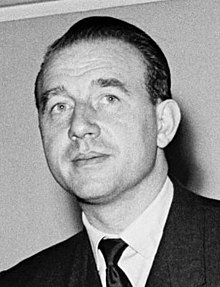Raymond Marcellin
This article needs additional citations for verification. (October 2023) |
Raymond Marcellin (French pronunciation: [ʁɛmɔ̃ maʁsəlɛ̃]; 19 August 1914 in Sézanne, Marne – 8 September 2004) was a French politician.

Biography
The son of a banker, he studied law at the
He initially supported the socialist governments of
In 1951, during his reelection campaign, he was allied with the
After being reelected in 1956, Raymond Marcellin did not support the socialist government of Guy Mollet. However, he approved Mollet's policies in Algeria, and voted for giving special powers to the Army in the fight against Front de Libération Nationale on 12 March 1956. He regularly voted for the renewal of these special powers. He also supported the Suez intervention. However, he voted against the fiscal package of the Mollet government that was supposed to finance the war in Algeria. This led to the fall of the Mollet government. Raymond Marcellin continued to support the engagement of French troops in Algeria, and voted against
During the fifth republic, he was a member of the National Center of Independents and Peasants (CNIP) and then of the Center of Social Democrats (CDS). On 15 May 1962 Raymond Marcellin entered the government as Minister of Health. In 1965, he was elected mayor of
After De Gaulle resignation, in 1969, Raymond Marcellin was maintained at the ministry of Interior by the new president
Raymond Marcellin was forced to resign on 27 February 1974, after policemen of the
He served as president of the Regional Council of Brittany from 1978 to 1986.
Writings
- L'orientation professionnelle et le placement des jeunes (Paris: Recueil Sirey, 1941) (Thesis, University of Strasbourg)
- with Maurice Bouvier-Ajam Les Principaux Problèmes de l'orientation professionnelle (Clermont-Ferrand: É. Chiron, 1942)
- L'Ordre public et les Groupes révolutionnaires (Paris : Plon, 1969)
- L'Importune Vérité. Dix ans après Mai 68, un ministre de l'Intérieur parle (Paris: Plon, 1978) (a book on the events of May 1968).
- La Guerre politique (Paris : Plon, 1985)
- L' Expérience du pouvoir (Paris : la Table ronde, 1990)
References
- ^ Assemblée nationale - Les députés de la IVe République : Raymond MARCELLIN
- ^ http://www.comite-histoire.minefi.gouv.fr/industrie/industrie_les_hommes/ministres_de_l_indus/downloadFile/attachedFile/Minindustrie.pdf [dead link]
- ^ Obituary: Raymond Marcellin | World news | The Guardian
- ^ Article in Charlie-Hebdo, the successor of Hara-Kiri
- ^ Anciens sénateurs Vème République : Raymond MARCELLIN
